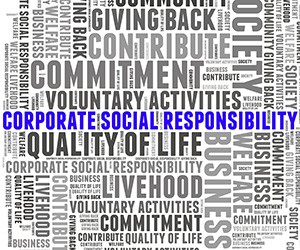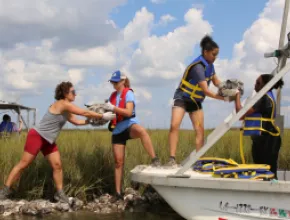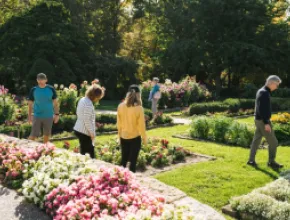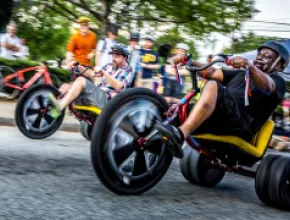Philanthropic team-building activities are seeing a spike in popularity at a time when corporate meetings are under public scrutiny from investors (and the press) and ROI metrics are more important than ever. Gone are multiday junkets to far-flung locations with limited accountability for dollars spent. These days, planners are feeling the pressure to make each dollar count and, at the same time, incorporate charitable causes into meeting agendas.
Enter extreme—as in “extremely critical”—CSR team-building programs. While a variety of excellent programs exist that help disadvantaged communities, Meetings Focus has identified three standout programs that help people in the most dire of situations.
Stopping Hunger
On a sunny day in December 2012, about 60 Google employees gathered on a patch of grass in the middle of the company’s campus in Mountain View, Calif. Half of the group wore blue hairnets, the other half wore white hairnets. Each team stood at long rectangular tables. In front of them was food to be assembled into meal packages for the hungry.
“We were working with Stop Hunger Now, an organization that sends food to Third World countries,” says Charlotte Johnson, people programs specialist at Google. “The teams got competitive and we ended up packaging thousands of meals for those in need. It was great fun.”
Stop Hunger Now is an international hunger relief organization that works with planners to do just what Google did—assemble thousands of meals for the hungry.
“More than 25,000 people die every day from hunger; our mission is to end hunger in this lifetime,” says Karen Sanders Noe, regional development director for Stop Hunger Now. “Our programs are incredibly effective; a group of 100 people can package up to 20,000 meals in just two hours.”
Sanders Noe is passionate about the organization’s cause and says groups can make a tremendous impact on world hunger by participating. “Parents in grief-stricken places are more apt to send kids to school if they have food,” she says. “And for every year of education, a person makes about 10 percent more in wages. We are committed to tackling this massive problem.”
Johnson has already facilitated three Stop Hunger Now events at Google and plans to do more. “While you make the meals, there is some friendly competition going on,” she says. “It is a great way to work as a team, a great way to meet people and a great way to provide real help to those who need it.” PageBreak
Giving the Gift of Mobility
It was about two years ago when Hillary Smith, CMP, CSEP, partner at Fort Lauderdale, Fla.-based Koncept Events, started planning a meeting for 120 international VIPs. She wanted to include a philanthropic team-building activity that would not only challenge her attendees, but also deliver maximum impact.
“We were bringing in people from all over the world, from places where there is extreme poverty, so we knew we had to do something outside the box and be sensitive to where they were coming from,” she says.
Smith stumbled upon a Helping Hands, a program facilitated by training outfit Odyssey Teams that helps groups build prosthetic arms for landmine victims in more than 20 countries. Smith called them up and less than one year later, Todd Demorest, lead facilitator with Odyssey, was standing in front of her group under an outdoor pavilion on a warm summer day.
The group, separated into teams of three and seated at round tables, listened to Demorest as he explained the extreme need around the world for prosthetic limbs, how more than 2,000 landmines explode each year, severing limbs of children and adults, and how the group was going to help those in need.
“It was really moving,” Smith says. “In two hours, our group made around 40 arms and the event sparked deep conversations between each attendee; about their own mobility, about how trivial their own problems are when compared with the people they were helping. Everyone was incredibly engaged.”
Smith’s experience is common, Demorest says, adding that the Helping Hands program is gaining in popularity since its founding four years ago.
“Our phone is ringing off the hook,” he says. “I think groups are feeling like they are in a fishbowl with how they spend their dollars, and if people are looking, they want to be caught doing something good.”
Odyssey Teams offers its program to groups in countries around the world and recommends paying for Demorest (or a member of his team) to help facilitate. But even groups on a budget have the option to participate.
“We can now send kits to groups,” he says. PageBreak
Cleaning Help for Locals in Need
The facts are sobering: More than 42 million Americans live on food stamps, according to the Economic Policy Institute, “and food stamps cannot be used to purchase hygiene products,” says Shawn Seipler, co-founder and CEO of Clean the World, a nonprofit that recycles and sanitizes hotel soap and gifts it to people in need around the globe. “That is why ONE Project is so important.”
Launched in the summer of 2012, ONE Project empowers meeting attendees to put together hygiene kits for disadvantaged persons in their own communities. Costs are $3 per kit (minimum order is 100) and include shipping, materials and a training video. At the end of the assembly process, attendees are encouraged to write a personal, positive note to the recipient.
“Since our launch, we’ve distributed about 200,000 hygiene kits,” Seipler says. “The kits include recycled bars of soap, shampoo, conditioner, lotion, a toothbrush, toothpaste, a wash cloth and the inspirational message, which really helps recipients.”
In January 2013, Nancy L. Bock, senior vice president, meetings and education at the American Cleaning Institute, facilitated a ONE Project event at an 800-person meeting and says it was a huge success.
“We kept a ballroom open and encouraged attendees to stop in and give back to those in need,” she says. “People got really into it. Next year they want to split into teams and make it competitive to help put together as many kits as possible.”
After the kits are assembled, Seipler encourages planners to partner with a local homeless organization for distribution.
“We offer a service where we will contact a local food pantry or homeless shelter and sometimes planners want to do that themselves,” he says. “It is always best to have a representative from the charity show up at the end to receive the kits; it helps engage attendees and gives them something to be proud of.”
Katie Morell is an independent journalist based in San Francisco. She is a former Meetings Focus editor and now writes for publications such as Hemispheres, USA Today and Consumers Digest. Read more of her work at www.katiemorell.com.






